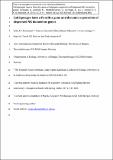Calcisponges have a ParaHox gene and dynamic expression of dispersed NK homeobox genes
Abstract
Sponges are simple animals with few cell types, but their genomes paradoxically contain a wide variety of developmental transcription factors1,2,3,4, including homeobox genes belonging to the Antennapedia (ANTP) class5,6, which in bilaterians encompass Hox, ParaHox and NK genes. In the genome of the demosponge Amphimedon queenslandica, no Hox or ParaHox genes are present, but NK genes are linked in a tight cluster similar to the NK clusters of bilaterians5. It has been proposed that Hox and ParaHox genes originated from NK cluster genes after divergence of sponges from the lineage leading to cnidarians and bilaterians5,7. On the other hand, synteny analysis lends support to the notion that the absence of Hox and ParaHox genes in Amphimedon is a result of secondary loss (the ghost locus hypothesis)8. Here we analysed complete suites of ANTP-class homeoboxes in two calcareous sponges, Sycon ciliatum and Leucosolenia complicata. Our phylogenetic analyses demonstrate that these calcisponges possess orthologues of bilaterian NK genes (Hex, Hmx and Msx), a varying number of additional NK genes and one ParaHox gene, Cdx. Despite the generation of scaffolds spanning multiple genes, we find no evidence of clustering of Sycon NK genes. All Sycon ANTP-class genes are developmentally expressed, with patterns suggesting their involvement in cell type specification in embryos and adults, metamorphosis and body plan patterning. These results demonstrate that ParaHox genes predate the origin of sponges, thus confirming the ghost locus hypothesis8, and highlight the need to analyse the genomes of multiple sponge lineages to obtain a complete picture of the ancestral composition of the first animal genome.
Citation
Fortunato , S , Adamski , M , Mendivil Ramos , O , Leininger , S , Liu , J , Ferrier , D E K & Adamska , M 2014 , ' Calcisponges have a ParaHox gene and dynamic expression of dispersed NK homeobox genes ' , Nature , vol. 514 , no. 7524 , pp. 620-623 . https://doi.org/10.1038/nature13881
Publication
Nature
Status
Peer reviewed
ISSN
0028-0836Type
Journal article
Description
This study was funded by the Sars Centre core budget to M. Adamska. Sequencing was performed at the Norwegian High Throughput Sequencing Centre funded by the Norwegian Research Council. O.M.R. and D.E.K.F. acknowledge support from the BBSRC and the School of Biology, University of St Andrews.Collections
Items in the St Andrews Research Repository are protected by copyright, with all rights reserved, unless otherwise indicated.

